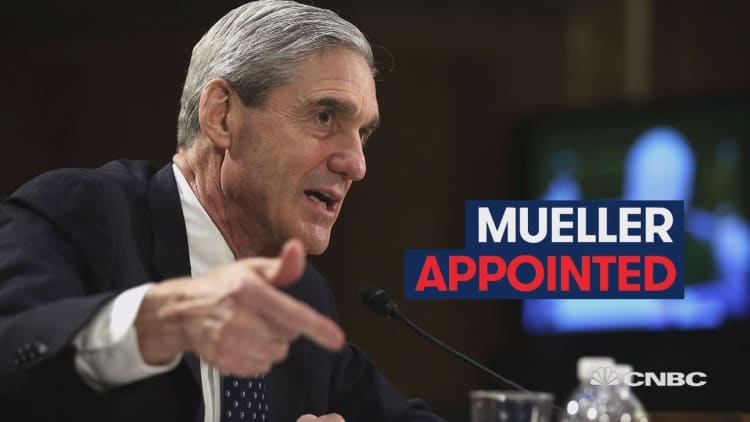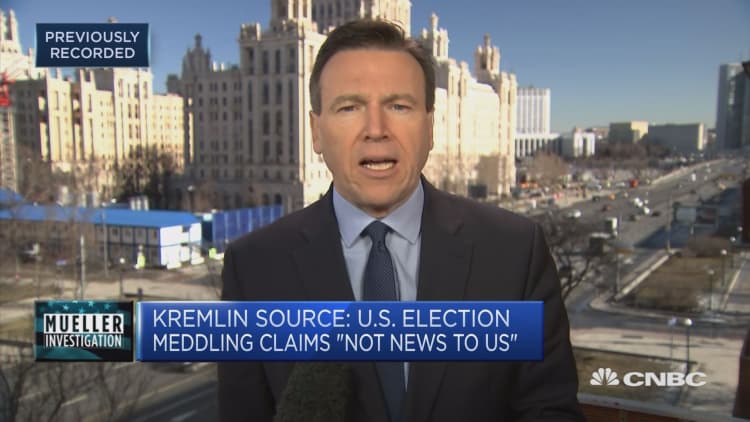The fight over special counsel Robert Mueller's Russia investigation will not end with Attorney General William Barr's summary of the probe.
In a letter to key members of Congress on Sunday, the top Justice Department official said Mueller wrote that the report "does not conclude that the President committed a crime, it also does not exonerate him." While the special counsel himself did not determine whether President Donald Trump obstructed justice by trying to influence the investigation, Barr said he and Deputy Attorney General Rod Rosenstein concluded there was insufficient evidence to charge the president with obstruction.
Barr also said that the probe did not conclude that Trump or anyone in his campaign "conspired or coordinated" with Russia in its influence campaign.
Trump, who repeatedly called the probe a "witch hunt," claimed victory after Barr's letter became public. But the attorney general's summary managed to spark new controversy, particularly about how Barr arrived at his conclusions in two days following a nearly two-year investigation. Trump may be cleared of obstruction in the opinion of the Justice Department, but other investigations into his conduct will go on.
Here's what happens next:
Congressional Democrats
Barr's four-page summary Sunday will only intensify Democrats' public lobbying to see Mueller's full report. The Democratic-held House also expects to drag the attorney general in to testify on how he came to his decision on whether the president obstructed justice.
Their push for more information from Barr will likely create tension with the Trump administration and congressional Republicans.
"It is unacceptable that, after Special Counsel Mueller spent 22 months meticulously uncovering this evidence, Attorney General Barr made a decision not to charge the President in under 48 hours. The Attorney General did so without even interviewing the President," House Judiciary Committee Chairman Rep. Jerry Nadler, House Intelligence Committee Chairman Rep. Adam Schiff and House Oversight Committee Chairman Rep. Elijah Cummings said in a joint statement Sunday.
"The Attorney General must release the report and the underlying evidence in full, and appear before the House Judiciary Committee to answer our questions without delay," they added.

House Speaker Nancy Pelosi and Senate Minority Leader Chuck Schumer also pushed for the release of Mueller's full report. They also contended that "given Mr. Barr's public record of bias against the Special Counsel's inquiry, he is not a neutral observer and is not in a position to make objective determinations about the report." (Before he became attorney general, Barr sent the Justice Department an unsolicited memo that criticized the investigation into possible obstruction by Trump as "fatally misconceived.")
As they lobby to see the special counsel's full findings, Democrats will point to a unanimous, bipartisan vote earlier this month calling for Barr to make Mueller's full conclusions public.
Democrats have also suggested they wanted to see Mueller's report before they decide whether to impeach Trump, a step many liberal voters and some members of Congress want to take. Pelosi appears unlikely to embrace impeachment barring a major revelation about the president.
Trump and congressional Republicans
Trump quickly claimed "complete and total exoneration" on Sunday, while his campaign turned its attention to a strong economy as it pushes toward a pivotal 2020 election. At the same time, some Republicans tried to use Barr's letter to make a case for ending separate investigations into the president's conduct.
In a statement Sunday, Trump campaign manager Brad Parscale argued that "Trump has kept his focus where it belongs: achieving for the American people."
"The American people should take notice: the Democrats have lied to you, while President Trump has been hard at work building a booming economy and making you safer," Parscale said.

Meanwhile, a key congressional Republican used Barr's summary as justification to end a separate, more sweeping House probe of Trump administration conduct. In a statement Sunday, House Judiciary Committee ranking member Rep. Doug Collins said Nadler "has the chance to rethink his sprawling investigation, which retreads ground already covered by the special counsel and is already a matter of public record."
Trump allies also suggested they could pressure the president's past political targets now that the Russia probe is done. On Sunday, former FBI Director James Comey tweeted a photo of himself looking at what appear to be redwood trees, writing, "so many questions."
In response, Senate Judiciary Committee Chairman Sen. Lindsey Graham, R-S.C., suggested he could bring the ex-FBI chief in for testimony.
"Could not agree more. See you soon," the senator said in a tweet.
Lindsey Graham tweet: Could not agree more. See you soon.
Graham also wants to bring Barr to speak before his committee, and make the testimony "as public as possible," he said Monday. When asked if Mueller should come before the committee, the senator said he would "leave that up to Mr. Barr."
Existing investigations
The close of the Mueller probe will not end existing investigations related to the president, both inside and outside of Congress.
Those include:
- He still faces potential legal exposure after his former lawyer, Michael Cohen, pleaded guilty to campaign finance violations for buying the silence of two women who claimed to have affairs with the president ahead of the 2016 election. Cohen said he made the "hush money" payments at Trump's direction.
- The trial for former Trump advisor Roger Stone, who was indicted in January in Mueller's probe and pleaded not guilty.
- New York state charges against former Trump campaign chairman Paul Manafort, who was convicted on eight fraud-related charges last year. The president could not pardon Manafort for a state crime.
- Nadler's sweeping investigation of alleged Trump administration misconduct.
- Democrats' efforts to get the president's tax returns.
Financial markets
The lack of a major revelation about coordination with Russia or an obstruction of justice charge takes away one potential risk factor for financial markets. Futures indicated a rise for U.S. stocks on Monday.
Some investors saw the lack of a Russia-related distraction as a good sign for the president making progress on his economic priorities, such as striking a trade deal with China to end a potentially devastating trade conflict.
Still, some market watchers had seen little risk to stocks from Mueller's investigation.
— CNBC's Tucker Higgins contributed to this report


